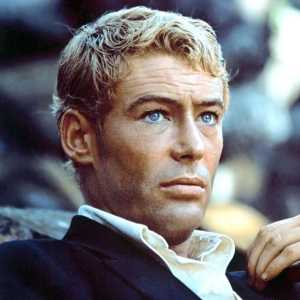Peter Seamus O'Toole (/oʊˈtuːl/; 2 August 1932 – 14 December 2013) was a British stage and film actor. He attended the Royal Academy of Dramatic Art and began working in the theatre, gaining recognition as a Shakespearean actor at the Bristol Old Vic and with the English Stage Company. In 1959 he made his West End debut in The Long and the Short and the Tall, and played the title role in Hamlet in the National Theatre's first production in 1963. Excelling on the London stage, O'Toole was known for his "hellraiser" lifestyle off it.
Making his film debut in 1959, O'Toole achieved international recognition playing T. E. Lawrence in Lawrence of Arabia (1962) for which he received his first nomination for the Academy Award for Best Actor. He was nominated for this award another seven times – for playing King Henry II in both Becket (1964) and The Lion in Winter (1968), Goodbye, Mr. Chips (1969), The Ruling Class (1972), The Stunt Man (1980), My Favorite Year (1982), and Venus (2006) – and holds the record for the most Oscar nominations for acting without a win (tied with Glenn Close). In 2002, he was awarded the Academy Honorary Award for his career achievements.
O'Toole was the recipient of four Golden Globe Awards, one BAFTA Award for Best British Actor and one Primetime Emmy Award. Other performances include What's New Pussycat? (1965), How to Steal a Million (1966), Supergirl (1984), and minor roles in The Last Emperor (1987) and Troy (2004). He also voiced Anton Ego, the restaurant critic in Pixar's Ratatouille (2007).
Early life and education
Peter Seamus O'Toole was born on 2 August 1932, the son of Constance Jane Eliot (née Ferguson), a Scottish nurse, and Patrick Joseph "Spats" O'Toole, an Irish metal plater, football player, and bookmaker. O'Toole claimed he was not certain of his birthplace or date, stating in his autobiography that he accepted 2 August as his birth date but had a birth certificate from England and Ireland. Records from the Leeds General Registry Office confirm he was born at St James's University Hospital in Leeds, Yorkshire, England on 2 August 1932.
O'Toole had an elder sister named Patricia and grew up in the south Leeds suburb of Hunslet. When he was one year old, his family began a five-year tour of major racecourse towns in Northern England. He and his sister were brought up in their father's Catholic faith. O'Toole was evacuated from Leeds early in the Second World War, and went to a Catholic school for seven or eight years: St Joseph's Secondary School in Hunslet, Leeds. He later said, "I used to be scared stiff of the nuns: their whole denial of womanhood—the black dresses and the shaving of the hair—was so horrible, so terrifying. Of course, that's all been stopped. They're sipping gin and tonic in the Dublin pubs now, and a couple of them flashed their pretty ankles at me just the other day."
Upon leaving school, O'Toole obtained employment as a trainee journalist and photographer on the Yorkshire Evening Post, until he was called up for national service as a signaller in the Royal Navy. As reported in a radio interview in 2006 on NPR, he was asked by an officer whether he had something he had always wanted to do. His reply was that he had always wanted to try being either a poet or an actor. He attended the Royal Academy of Dramatic Art (RADA) from 1952 to 1954 on a scholarship. This came after being rejected by the Abbey Theatre's drama school in Dublin by the director Ernest Blythe, because he could not speak the Irish language. At RADA, he was in the same class as Albert Finney, Alan Bates and Brian Bedford. O'Toole described this as "the most remarkable class the academy ever had, though we weren't reckoned for much at the time. We were all considered dotty."
